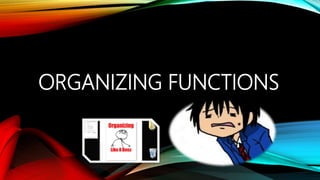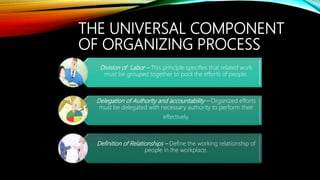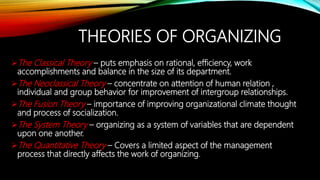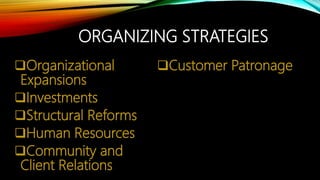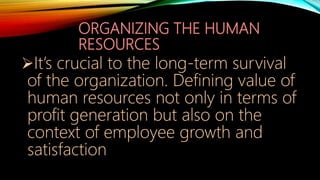Organizing functions
- 2. ORGANIZING AS A MANAGEMENT PROCESS Organizational design develops mechanism in which people operate accordingly .
- 3. THE UNIVERSAL COMPONENT OF ORGANIZING PROCESS Division of Labor – This principle specifies that related work must be grouped together to pool the efforts of people. Delegation of Authority and accountability – Organized efforts must be delegated with necessary authority to perform their effectively. Definition of Relationships – Define the working relationship of people in the workplace.
- 4. TO EFFECTIVELY IMPLEMENT THE ORGANIZING PROCESS 1. Establishing clear objectives 2.Formulate policies and procedure to carry out objectives 3.Identify and classify the activities necessary to carry out objectives. 4.Group activities in the light of human and material resources.
- 5. 5. Delegate authority to the line executives and define accountability. 6. Define the vertical and horizontal relationships. 7. Develop effective coordination and reporting system of accomplishments.
- 6. THEORIES OF ORGANIZING The Classical Theory – puts emphasis on rational, efficiency, work accomplishments and balance in the size of its department. The Neoclassical Theory – concentrate on attention of human relation , individual and group behavior for improvement of intergroup relationships. The Fusion Theory – importance of improving organizational climate thought and process of socialization. The System Theory – organizing as a system of variables that are dependent upon one another. The Quantitative Theory – Covers a limited aspect of the management process that directly affects the work of organizing.
- 7. ORGANIZING STRATEGIES Organizational Expansions Investments Structural Reforms Human Resources Community and Client Relations Customer Patronage
- 8. STRATEGIC MARKETING SYSTEM a) The need and want of the potential customers b) The Strategy of procedure and sell the product c) The Competitors and strategy to overcome them. d)Pricing and marketing strategy to earn profit and market share. e) Customer satisfaction and long term patronage.
- 9. EFFECTIVE IMPLEMENTATION OF STRATEGIES Communicate strategies to all key decision- making managers Develop and communicate planning premises Ensure that action reflect major objectives and strategies Review strategies regularly Develop contingency and alternative strategies and programs Create an organize climate of mutual trust and confidence among managers
- 10. TOOLS AND TECHNIQUES FOR EFFECTIVE IMPLEMENTATION Organizatio n Data Base Accom- plishment Reports Communicatio n Flow Chart Manual of Operation and Policy Guidelines
- 11. PARTICIPATION OF EMPLOYEE IN AN ORGANIZED SYSTEM Psychological Involvement Personal Motives and Interest Acceptance of Responsibility
- 12. EMPLOYEES’ PARTICIPATION MUST SATISFY THE FF. REQ. 1. There must be time to participate before the required action to take place 2. Participants must have the intelligence and knowledge about the topic at hand. 3. They must have the ability to participate actively in group discussions 4. The topic must be relevant to the interest of the employees 5. The decision of the group must be carried out and check accordingly to its intent and purpose. 6. The time frame must not interfere with the regular work load and its cost should not exceed its value
- 13. ORGANIZING AND STUFFING Organizing is staffing the structure with the qualified people who run the management of the organizations.
- 14. DETERMINANTS OF MANAGERIAL STAFFING Hiring managerial positions is like choosing a driver for a certain type of vehicle. A jeep driver would know only the direction of his assigned route.
- 15. QUALITIES FOR MANAGERIAL POSITIONS Above Average Intelligence Integrity and Industry Maturity and Aggressiveness Effective Communication Skills Human Relations Pleasing Personality Higher Level of Education
- 16. ORGANIZING THE HUMAN RESOURCES It’s crucial to the long-term survival of the organization. Defining value of human resources not only in terms of profit generation but also on the context of employee growth and satisfaction
- 17. THIS FF. PROCEDURE WILL HELP GET THE RIGHT EMPLOYEE • Establish selection procedure • Identify and choose selection criteria, predictors and instruments suited to determine the right applicant • Gather and evaluate all relevant information about the applicant through interview and reference checks • Subject applicant to various test including mental and physical examination
- 18. TRAINING AND DEVELOPMENT Is the process of acquiring new knowledge and skills imminent for effective and efficient performance of assigned task.
- 19. THE CHALLENGES IN ORGANIZING THE HUMAN RESOURCES The challenge of the global community The challenge of Increase Productivity The stockholders and others Stakeholders
- 20. EFFECTIVE ORGANIZING TIPS THAT DELIVER RESULTS Keep a Visible Plan in Action List Items and schedules Develop Happy People at Work Organized Your Files and Other Items Religiously Comply with your Commitment Keep in Touch
- 21. encer1st
